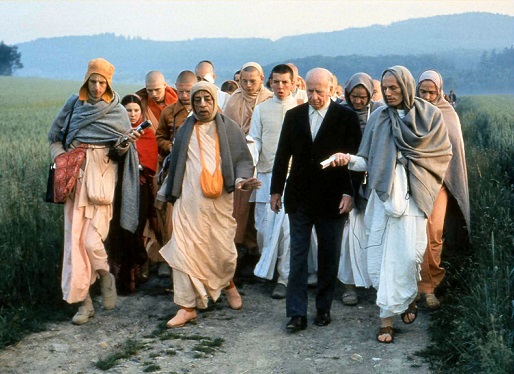(Click to enlarge photo of Srila Prabhupada with Professor Durckheim and devotees)
Prabhupāda: …ahaṁ brahmāsmi: "I am spirit soul." So without that realization, there is no question of devotional life. So that is first understood. That instruction is being given by Kṛṣṇa to Arjuna, that "You are considering very seriously on this body, but a learned man does not take this body very seriously, either dead or alive." That is the first realization. So everyone in this world, they are concerned with this body, dead or alive. When alive, they take care of the body in so many ways, and when dead they erect big statue upon it. So that realization is this body. When it is alive, very nicely dressed, nicely groomed, nicely everything on account of this body, and when dead, then again the statue, the tomb, that's all, but missing the active principle. He is taking care of this body even after death by erecting very nice memorial, but he has no knowledge where the active principle has lost. That is ignorance.
Professor Durckheim: When I was a young man, I was four years in the World War.
Prabhupāda: Four years.
Professor Durckheim: Four years. Forty-eight months almost in the foremost front. And I was one of the two officers...
Prabhupāda: In First World War? First World War?
Professor Durckheim: World War I, 1914 to 1918.
Prabhupāda: Yes. Yes.
Professor Durckheim: And I was one of the two officers who were not wounded in my regiment. And there I met death again and again. And I saw people just killed next to me. Suddenly it was out. It was just only, as you say, the body without soul. But I realized also, in myself, that when death was near and you had accepted death, accepted to die, then you realized something which has nothing to do whatsoever with death.
Prabhupāda: Yes. That is self-realization.
Professor Durckheim: So this marked me very much. It's the very beginning of my inner way, these four years of World War.
Prabhupāda: There is a verse, nārāyaṇa-parāḥ sarve na kutaścana bibhyati (SB 6.17.28). If one is God-realized soul, he is not afraid of anything. Svargāpavarga-narakeṣv api tulyārtha-darśinaḥ. So actually, if one is self-realized, he is no more fearful or concerned with the bodily necessities of life. That is liberation. Just like as you mentioned sleeping. Sleeping also, a bodily necessity. When you are tired, you sleep. That is bodily necessity. But it is not spiritually necessary. About the Gosvāmīs it is said, nidrāhāra-vihārakādi-vijitau: "conquered over sleeping, eating, mating." That is also one of the symptoms of self-realization. These things are necessities of the body. So the more one is advanced in self-realization, these things will be minimized: eating, sleeping, mating and defending. And gradually it will come to nil, because this is bodily necessities. Self, the active principle, that is different. The active principle, necessity is different. That is Kṛṣṇa consciousness, God consciousness. But these are bodily necessities: eating, sleeping, mating. So, so long this body is there, of course, we must eat, we must sleep. That is required. But the more we advance, these necessities diminished. Yes. Bhaktiḥ pareśānubhavo viraktir anyatra syāt (SB 11.2.42). Then sleeping will be considered a waste of time. A self-realized man goes to sleep, he thinks that "I am going to waste so much time, because still I am subjected to the necessities of this body." He regrets.
Professor Durckheim: The progress of self-realization is a sequence of experiences, isn't it, of inner experiences?
Prabhupāda: Yes.
Professor Durckheim: The progress of self-realization is a progress of inner experiences.
Prabhupāda: Yes.
Professor Durckheim: And I do believe that at the actual moment still, the treasure in the European peoples, the different peoples who went through the war, through concentration camps, through battlefields and bombing nights, are hidden in their hearts certain moments when death was near and they were wounded and nearly torn in pieces. Because they had a certain experience they survived. And again and again, when I give a lecture, I have two or three people waiting, telling me, "Now you just reminded me an experience long ago, ten days ago, two months ago, when I thought I was a little bit crazy, and now I understand it has been the experience, perhaps the most important of my life, on which I should have built my future inner way." And these experiences are still there. And once people understand, they don't need a war and a battleship and a concentration camp and a bombing night to take serious certain inner experiences when they are suddenly are touched by this divine reality, and they suddenly feel that this bodily existence is not lasting at all.
Prabhupāda: That's it. That we can experience every night.
Professor Durckheim: Yes, exactly.
Prabhupāda: When you dream, my body is left on the bed and I go somewhere. That we experience, that I am separate from this body. At that time I forget my this body is lying down on the bed. I am acting in a different atmosphere. So, and again, in daytime, I forget that at night I was in a different body, and I went to such-and-such place or on the sky I was flying. I forget. At night I forget this body and at daytime I forget that body. But I am existing. Therefore I am not this body. I am existing in this body and that body, but that body I have forgotten, and this body I forget. So this is a structure on my mind only. Actually, I am different from the mind. And that is self-realization.
(Srila Prabhupada Conversation with Professor Durckheim, Germany, June 19, 1974)
.
